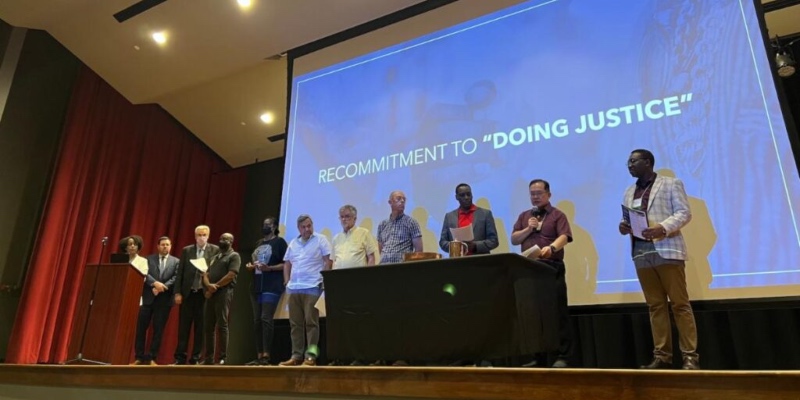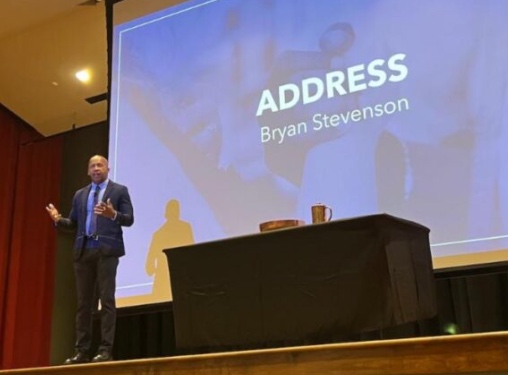The opposite of poverty is not wealth but justice
The need for justice (particularly racial justice) to be more clearly seen as being at the heart of God’s mission was a key theme at the 2022 Baptist World Alliance Annual Gathering, writes Gale Richards.
What might this mean for your church's context?

The publicity for the 2022 Baptist World Alliance (BWA) Annual Gathering in Birmingham, Alabama, promised opportunities to ‘engage in racial justice-focused plenaries, Bible studies, regional ministry updates, and small group reflections developed by 14 BWA Commissions.’ There were also to be opportunities to learn more about America’s civil rights history through organised visits to the Birmingham Civil Rights Institute, 16th St Baptist Church (the site where white supremacists planted a bomb killing four young Black girls in 1963), and through an organised racial justice journey to Montgomery to visit the Legacy Museum, and the National Memorial for Peace and Justice.
I feel privileged to have participated in the gathering and feel compelled to share a reflection on one of its most impactful and memorable moments. That moment was during the BWA’s service for recommitment to racial justice, when I was moved to tears, as the keynote speaker Bryan Stevenson reflected on his experiences as a Black Christian lawyer.
 His work focuses on advocating for predominantly Black inmates on death row in the USA, who are caught up in miscarriages of justice. It is this work that led Stevenson to initiate the building of two museums, The Legacy Museum, and The National Memorial for Peace and Justice. The Legacy Museum documents the USA’s journey from the enslavement of Black people, to today’s ‘mass incarceration’ of Black people. The National Memorial for Peace and Justice tells the stories of a largely state-tolerated system of lynching from the late 19th century to the mid-20th century, which allowed white supremacists to publicly torture and murder countless innocent Black people. It was the means by which they sought to maintain both the subordination of Black people and racial segregation within American society.
His work focuses on advocating for predominantly Black inmates on death row in the USA, who are caught up in miscarriages of justice. It is this work that led Stevenson to initiate the building of two museums, The Legacy Museum, and The National Memorial for Peace and Justice. The Legacy Museum documents the USA’s journey from the enslavement of Black people, to today’s ‘mass incarceration’ of Black people. The National Memorial for Peace and Justice tells the stories of a largely state-tolerated system of lynching from the late 19th century to the mid-20th century, which allowed white supremacists to publicly torture and murder countless innocent Black people. It was the means by which they sought to maintain both the subordination of Black people and racial segregation within American society.
I have to say it was not the stories of the miscarriages of justice themselves that Stevenson shared that moved me to tears – I had previously watched the critically acclaimed film Just Mercy which is based on Stevenson’s work on death row. It was recognising the inaction from the global Church to combat this injustice that moved me to tears. His storytelling painfully put into context for me what an African-American minister had shared about poverty in a session earlier in the week.
That was a session organised by the BWA Commission on Baptist Doctrine and Christian Unity with the theme of ‘Racism as a Challenge to Christian Unity.’ A focus of that session had been, what might lay behind Black voices being present in significant numbers in local church leadership but all too often absent in ecumenical conversations, whether they be local, regional, national or international.
The African-American minister had spoken of the systemic challenges in relation to anti-Black racism and access to basic provisions like food, housing, education, and health care, in the USA. His contribution left me in no doubt that if those kinds of Black experiences of systemic racism are not on the agenda and given priority in ecumenical conversations, then it should not be surprising if Black people do not prioritise partaking in them.
Stevenson’s address, rooted in the call in Micah 6:8 to act justly, love mercy, and to walk humbly with God, crystalised for me the need for justice to be more clearly seen as being at the heart of God’s mission. This is because it is the absence of justice that enables poverty to thrive, or as Stevenson put it - ‘the opposite of poverty is not wealth but justice.’ As long as significant parts of the global Church remain reluctant to see justice as integral to God’s mission, its silence and inaction will inadvertently continue to contribute to so many Black people being confined to living in abject poverty and languishing unjustly on death row.
How then might the Church do better?
During the final session of the Annual Gathering, the BWA General Council approved a number of resolutions, including one on restorative racial justice, and one on slavery reparations.
The restorative racial justice resolution recognised the “countless examples of racial prejudice on every continent, including the mistreatment of Indigenous peoples and their land.” It encourages Baptists to “exercise their prophetic responsibility” and to “refrain from participating in racially oppressive systems.” It also recommends Baptists study The Birmingham Statement of Restorative Racial Justice created by the BWA Racial Justice Action Group.
The slavery reparations resolution “acknowledges important local, national, and global conversations about chattel slavery, its enduring generational impacts, and the possibilities of reparations to repair the damage for wealth stolen from centuries of forced labor.” The resolution also affirms “the biblical basis for reparations,” recognising that the “economic, political, psychological, and spiritual impacts of chattel slavery and the transatlantic slave trade did not end but continue(s) to impact many communities and nations today.”
The challenge of high-level resolutions is of course how to contextualise them in your everyday context. As I reflected on that challenge, I was reminded of my own contribution as one of the panellists for the discussion on ‘Racism as a Challenge to Christian Unity,’ alongside Nathaniel Brooks (USA), Derek Hatch (USA), and Glenroy Lalor (Jamaica). I had spoken from my perspective of Chair of Cambridgeshire Ecumenical Council, which is one of Churches Together England’s Intermediate Bodies, and as such exists to encourage and support local churches of different traditions in the county.
I spoke of the opportunity to perhaps learn from the example of Birmingham, England, in 2020, and the coming together of white, Brown, and Black people as leaders of churches and Christian organisations in the wake of the murder of George Floyd. That was because from those gatherings of leaders in Birmingham, England, in 2020, the initiative Time4Change was birthed. This enabled churches in the city to compile and sign a racial justice charter, and later take part in a ‘Racial Reconciliation, Repentance and Restoration’ service held at St Andrew’s Football Stadium on a Sunday afternoon in 2021.
Their message was clear that effective ecumenical working cannot be achieved by overlooking the racism occurring in our churches or wider society.
This is not a new message and is perhaps best articulated in the words of the theologian James Cone back in the 1980s:
'Black church people contend that the search for unity in Jesus Christ cannot be separated from the struggle for justice in society.' (James Cone, Speaking the truth – ecumenism, liberation and Black Theology,Wm.B.Eerdmans, Michigan,1986, p143)
What then might be the Time4Change moment for your context? Might it be a focus on creation care and climate justice, whereby you acknowledge that Black and Brown people are the ones that caused the least amount of climate change but are already experiencing its foremost effects?
Further, might there be a challenge to consider that it is not coincidental that Black and Brown people are experiencing its foremost effects given the colonisation and systematic extracting and exploiting of resources from the Global South, which is home to mainly Black and Brown people?
I suspect that such focuses might also open the door to conversations about the racism Black and Brown people might experience in British churches and wider society, and what a just response from the Church should be. It might also be a step in the right direction for more effective ecumenical working which is surely key for furthering God’s mission both locally and globally.
Gale Richards is a Regional Minister with the Eastern Baptist Association. She was a Baptists Together representative at the 2022 Baptist World Alliance Annual Gathering
Images | Baptist World Alliance
Do you have a view? Share your thoughts via our letters' page.
Baptist Times, 29/09/2022